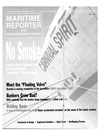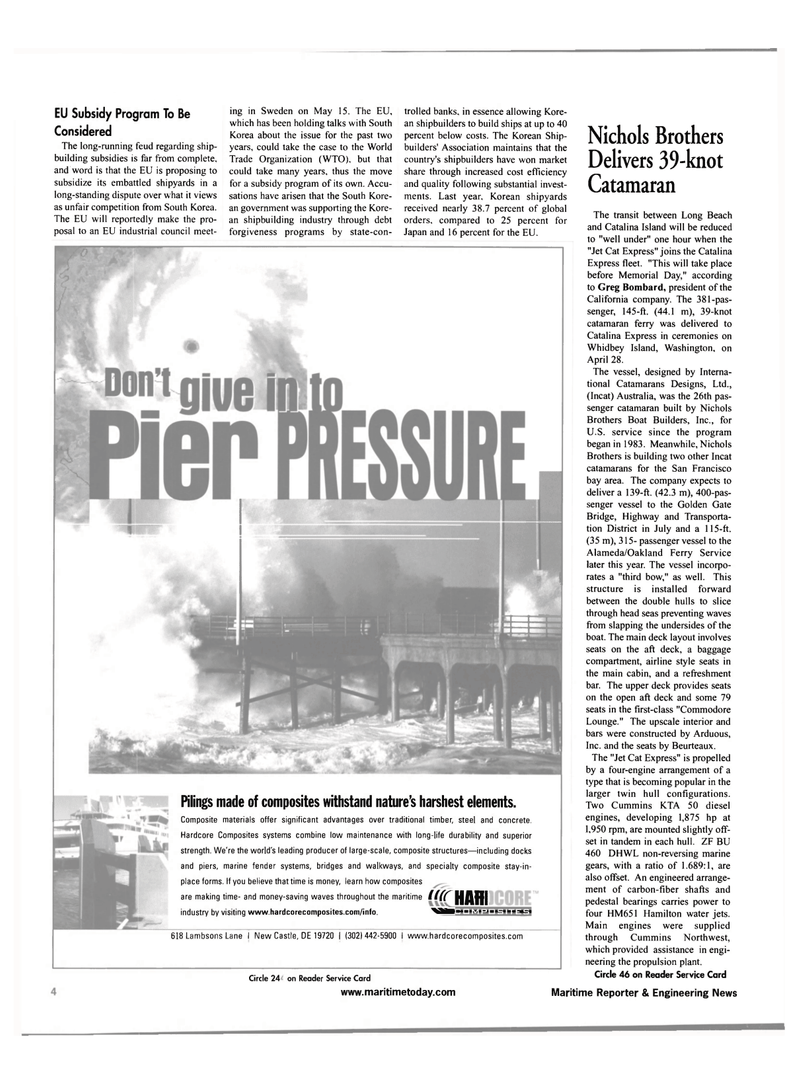
Page 4: of Maritime Reporter Magazine (May 2001)
Read this page in Pdf, Flash or Html5 edition of May 2001 Maritime Reporter Magazine
EU Subsidy Program To Be
Considered
The long-running feud regarding ship- building subsidies is far from complete, and word is that the EU is proposing to subsidize its embattled shipyards in a long-standing dispute over what it views as unfair competition from South Korea.
The EU will reportedly make the pro- posal to an EU industrial council meet- ing in Sweden on May 15. The EU, which has been holding talks with South
Korea about the issue for the past two years, could take the case to the World
Trade Organization (WTO), but that could take many years, thus the move for a subsidy program of its own. Accu- sations have arisen that the South Kore- an government was supporting the Kore- an shipbuilding industry through debt forgiveness programs by state-con- trolled banks, in essence allowing Kore- an shipbuilders to build ships at up to 40 percent below costs. The Korean Ship- builders' Association maintains that the country's shipbuilders have won market share through increased cost efficiency and quality following substantial invest- ments. Last year, Korean shipyards received nearly 38.7 percent of global orders, compared to 25 percent for
Japan and 16 percent for the EU.
Pilings made of composites withstand nature's harshest elements.
Composite materials offer significant advantages over traditional timber, steel and concrete.
Hardcore Composites systems combine low maintenance with long-life durability and superior strength. We're the world's leading producer of large-scale, composite structures—including docks and piers, marine fender systems, bridges and walkways, and specialty composite stay-in- place forms. If you believe that time is money, learn how composites are making time-and money-saving waves throughout the maritime (ffiT ||||| industry by visiting www.hardcorecomposites.com/info. VBB»l'iaiJ»M»3|j 618 Lambsons Lane New Castle, DE 19720 (302)442-5900 www.hardcorecomposites.com
Nichols Brothers
Delivers 39-knot
Catamaran
Circle 264 on Reader Service Card www.maritimetoday.com
The transit between Long Beach and Catalina Island will be reduced to "well under" one hour when the "Jet Cat Express" joins the Catalina
Express fleet. "This will take place before Memorial Day," according to Greg Bombard, president of the
California company. The 381-pas- senger, 145-ft. (44.1 m), 39-knot catamaran ferry was delivered to
Catalina Express in ceremonies on
Whidbey Island, Washington, on
April 28.
The vessel, designed by Interna- tional Catamarans Designs, Ltd., (Incat) Australia, was the 26th pas- senger catamaran built by Nichols
Brothers Boat Builders, Inc., for
U.S. service since the program began in 1983. Meanwhile, Nichols
Brothers is building two other Incat catamarans for the San Francisco bay area. The company expects to deliver a 139-ft. (42.3 m), 400-pas- senger vessel to the Golden Gate
Bridge, Highway and Transporta- tion District in July and a 115-ft. (35 m), 315- passenger vessel to the
Alameda/Oakland Ferry Service later this year. The vessel incorpo- rates a "third bow," as well. This structure is installed forward between the double hulls to slice through head seas preventing waves from slapping the undersides of the boat. The main deck layout involves seats on the aft deck, a baggage compartment, airline style seats in the main cabin, and a refreshment bar. The upper deck provides seats on the open aft deck and some 79 seats in the first-class "Commodore
Lounge." The upscale interior and bars were constructed by Arduous,
Inc. and the seats by Beurteaux.
The "Jet Cat Express" is propelled by a four-engine arrangement of a type that is becoming popular in the larger twin hull configurations.
Two Cummins KTA 50 diesel engines, developing 1,875 hp at 1,950 rpm, are mounted slightly off- set in tandem in each hull. ZF BU 460 DHWL non-reversing marine gears, with a ratio of 1.689:1, are also offset. An engineered arrange- ment of carbon-fiber shafts and pedestal bearings carries power to four HM651 Hamilton water jets.
Main engines were supplied through Cummins Northwest, which provided assistance in engi- neering the propulsion plant.
Circle 46 on Reader Service Card 6 Maritime Reporter & Engineering News

 3
3

 5
5
